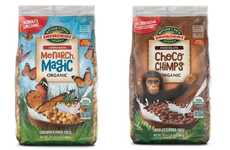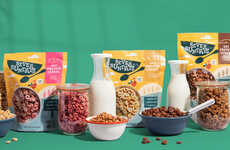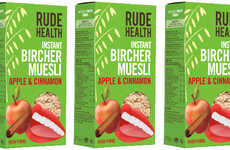
This Cinnamon Cereal Boasts Alternative Agriculture Products
Laura McQuarrie — March 29, 2017 — Eco
References: backtotheroots
There are hundreds of cinnamon cereal products on the market, but few of them can boast biodynamic certifications as Back to the Roots' Cinnamon Clusters can.
Back to the Roots' Cinnamon Clusters recognized as the nation's first Certified Biodynamic breakfast cereal, made with biodynamic ingredients like cane sugar from Paraguay and cinnamon from Sri Lanka. Like organic farming, biodynamic agriculture is an alternative way of growing crops in a way that puts an emphasis on creating a balanced ecosystem, encouraging biodiversity and composting on site.
Although it is usually milk that comes in a carton, this cinnamon breakfast cereal is packaged by the carton so that it can be easily poured, sealed and recycled, especially as an alternative to wasteful bag-in-the-box options.
Back to the Roots' Cinnamon Clusters recognized as the nation's first Certified Biodynamic breakfast cereal, made with biodynamic ingredients like cane sugar from Paraguay and cinnamon from Sri Lanka. Like organic farming, biodynamic agriculture is an alternative way of growing crops in a way that puts an emphasis on creating a balanced ecosystem, encouraging biodiversity and composting on site.
Although it is usually milk that comes in a carton, this cinnamon breakfast cereal is packaged by the carton so that it can be easily poured, sealed and recycled, especially as an alternative to wasteful bag-in-the-box options.
Trend Themes
1. Biodynamic Agriculture - Disruptive innovation opportunity: Explore the potential of biodynamic farming methods to create sustainable and eco-friendly agricultural practices.
2. Certified Biodynamic Products - Disruptive innovation opportunity: Develop certified biodynamic products in various industries to meet the growing demand for sustainable and ethically-produced goods.
3. Eco-friendly Packaging - Disruptive innovation opportunity: Innovate in packaging design to create more sustainable and recyclable options for products, reducing waste and environmental impact.
Industry Implications
1. Food and Beverage - Disruptive innovation opportunity: Incorporate biodynamic and sustainable practices in food and beverage production to offer consumers healthier and more environmentally friendly options.
2. Organic Farming - Disruptive innovation opportunity: Explore how organic farming methods can be further optimized and scaled up to meet the increasing demand for organic products.
3. Packaging and Recycling - Disruptive innovation opportunity: Develop innovative packaging solutions that prioritize sustainability and recyclability, reducing the negative environmental impact of packaging waste.
4.3
Score
Popularity
Activity
Freshness























